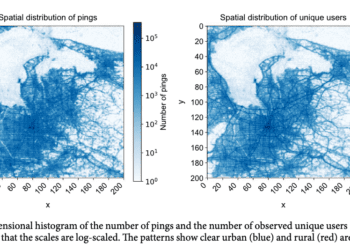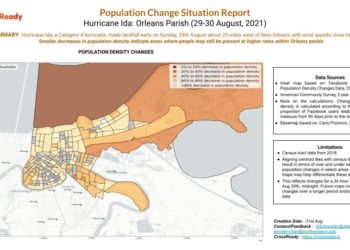On June 8 and 9, 2022, The National Academy of Science is hosting a virtual workshop, organized and co-chaired by CrisisReady co-director Caroline Buckee, to examine the ways location data is gathered, understood, and used by governments, academics, and industries during disasters.
The workshop will primarily focus on the uses of these data in public health, research, and law enforcement contexts.
Both sessions of the workshop will include panel discussions with representatives from the United States and abroad. In the first workshop on Wednesday, June 8, CrisisReady co-director and VP of research at Direct Relief, Andrew Schroeder, will discuss how user location data can play a pivotal role in disaster response and crisis preparedness. Key themes presented in CrisisReady’s white paper, “The Use of Human Mobility Data in Public Health Emergencies,” will help guide Andrew Schroeder’s discussion on this topic.
Workshop Day I
Wednesday, June 8, 2022; 11:30 AM – 5:00 PM EDT
The first part of the workshop will convene representatives from multinational technology companies, academic institutions, research organizations, and NGOs.
The session featured discussions on various topics, ranging from the mechanisms to collect user location data, methods used to aggregate and anonymize these data, and use cases that demonstrate the utility of these data in disaster, public health, and national security contexts.
Each panelist segment of the workshop will conclude with a discussion led by the workshop committee and a Q&A session with the audience.
Segments and points of conversation include:
The Collection of Location Data
Begins at 11:45 AM EDT
- Mechanisms used to collect location data
- Location data granularity and coverage
- How location data is used privately and publicly
- How location data is shared and sold
Aggregation and Anonymization of Location Data: The State of the Art
Begins at 1:25 PM EDT
- Common uses of and analytic methods applied to location data
- Data de-identification and aggregation practices and the degree to which they are standardized, and protective of privacy
- The tailoring of data use and granularity to research needs
Location Data Use Cases
Begins at 2:55 PM EDT
- The efficacy of mobility data to achieve the research purposes for which it is used, especially given the involvement of unspecialized corporate actors in many of these efforts, and the absence of uniform data quality and methodological standards
Workshop Day II
Thursday, June 9, 2022; 11:00 AM – 4:45 PM EDT
Location Data: Privacy Concerns and Risks of Harm
Begins at 11:05 AM EDT
- What precise location information about individuals reveals about private conduct and habits
- Potential risks of harm of the collection and use of location information by public health and other researchers and law enforcement
- How risks of harm can be reduced or mitigated
- Risks to groups or society
Location Data and Community
Begins at 12:10 PM EDT
- Implications of location data for privacy and connected democratic principles, as well as disparate impacts on historically vulnerable populations
- Public awareness of the collection and use of location and proximity data, as well as the role of voluntary participation and consent
- The degree to which collection, retention, and sharing of data are appropriate and tailored, in scope and in substance, to the purposes for which they are used
Location Data Governance
Begins at 1:55 PM EDT
- Governance frameworks for the use of location data and how they vary in the contexts of public health, academic research, and law enforcement
- Gaps in governance frameworks
New Approaches to the Governance of the Use of Location Data
Begins at 3:00 PM EDT
- The nature of potential changes to governance models for location data, including pertinent ethical frameworks that could be adapted to regulate location data, such as researcher privacy agreements/standards, confidentiality certificates, and Institutional
- Review Board governance models
- The role of corporate best practices in this sphere, given the role of technology firms as the primary originators and stewards of mobility data



